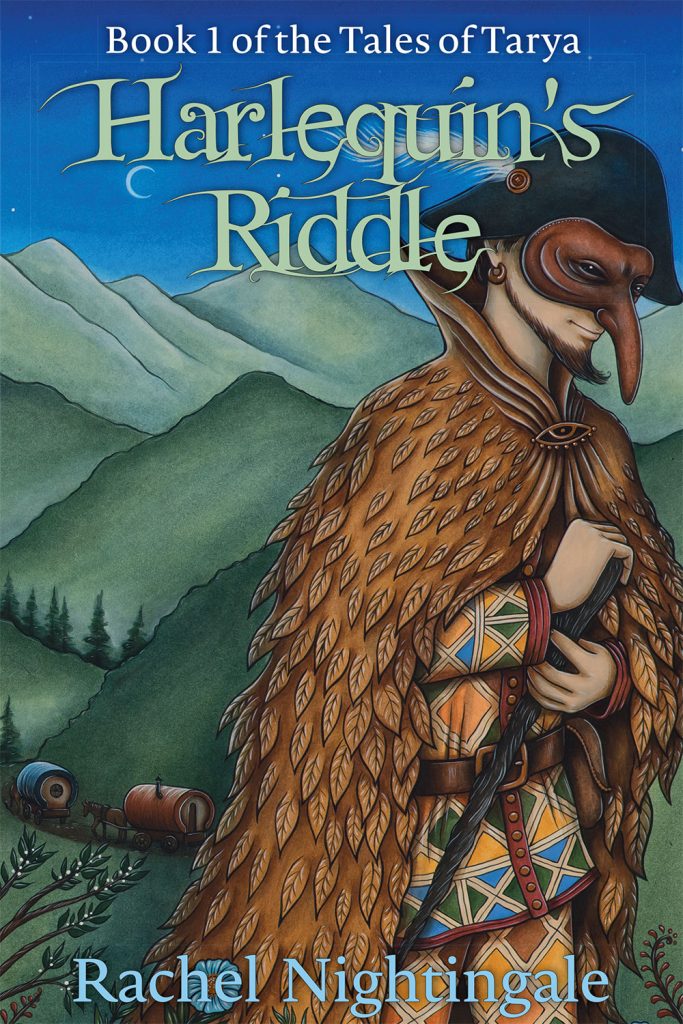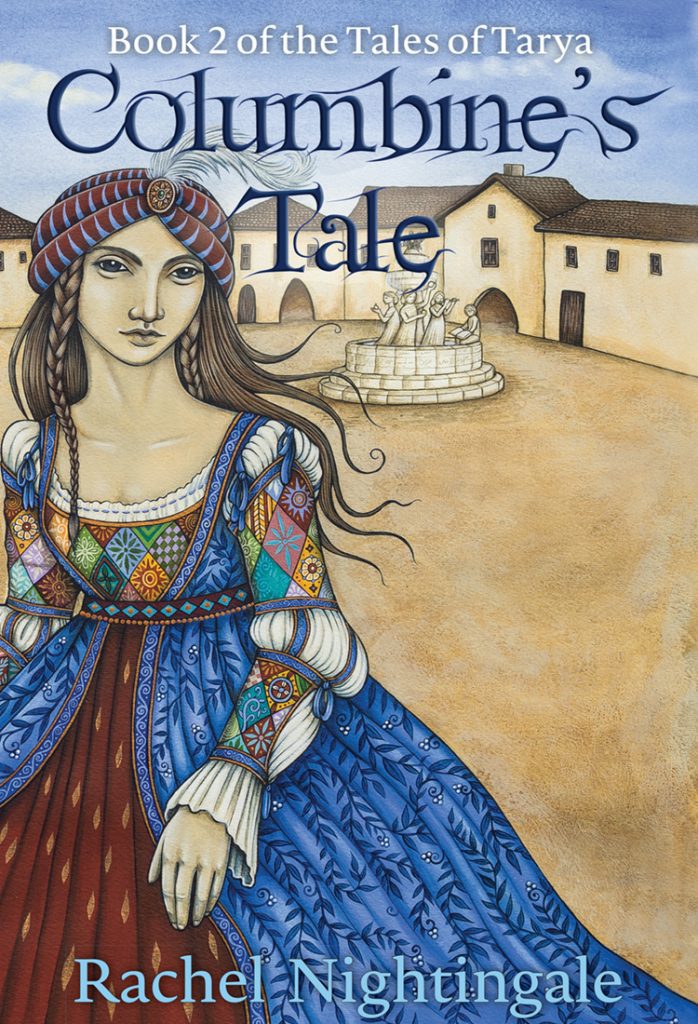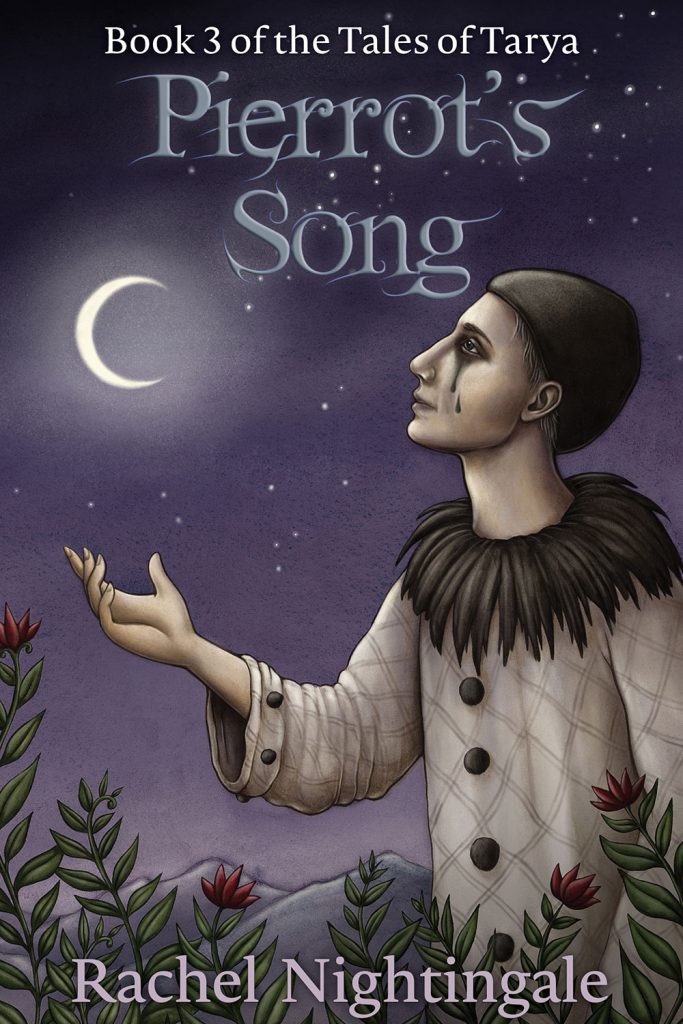Rachel Nightingale is an award-winning playwright and novelist with a PhD in Creative Writing. She’s come a long way since she wrote her first book, about Pasha the bear, at the age of eight. With a background in theatre, both onstage and off, she wanted to bring the world of the stage to her books. The Tales of Tarya centre on the Commedia dell’Arte of the Italian Renaissance and explore what it might look like if the magic of the theatre was real and if story tellers could bring about change in the real world with their tales.
What inspired the world of Tarya in your novels?
Although my book has been compared to The Night Circus (TNC), I actually completed Harlequin’s Riddle a long time before TNC came out, so it wasn’t actually an inspiration. In fact, it was a problem as Dario was originally called Marco, who is the central character in TNC, so I had to change his name. What did inspire me was an interview about acting I read in a magazine. Actor Alan Cumming was performing in a Broadway revival of Cabaret as the emcee, and he talked about how the moment before you step onstage is filled with possibility, like being about to step into Turiya, which is heaven in Hindu belief. That quote gave me the idea of a realm that you could reach when you were performing, or telling a tale, or undertaking any other sort of creative art. And the whole story grew from that.
Do you find the characters and settings in your books are based upon your own life experiences?
The characters have little pieces of people I know, but none of them are based on a single person. They’re more based on the characters of the Commedia dell’Arte, as that is what the book is about. But my background in theatre played a huge part in creating the story. As a performer I have experienced what it is like to become someone else when you play a character. I’ve also felt the exchange of energy that happens between the actors and the audience. These experiences fed into the mystical aspects of Tarya, while my experience in improvised theatre fed into what the players do. My experiences in creating Renaissance-era dresses and attending medieval feasts, as a historical re-enactor, fed into my descriptions of garb and setting.
What adventures can we expect your characters to take in the final book of your trilogy?
I absolutely can’t say at this point! The Tales of Tarya series has a mystery underpinning it that runs through all three books, and the third book is all about revealing what is really going on and who is behind it, so if I say anything it will be a spoiler. What I can say is that the characters will be visiting some rather out of the way places to uncover the lost history of Litonya. It’s less than a month until the book is released now though so readers will be able to find out for themselves very soon.
What is your biggest motivation for writing?
I love telling stories, and I love experiencing the creative process. Once I have managed to place myself in the right creative mindset, my brain just doesn’t stop – I start hearing characters speak, and making links between ideas, and picturing scenes as though they are happening right in front of me. It’s really exciting to experience, as long as I can type fast enough to get it all down.
How many books have you written?
At this stage I’ve written six books. The three in the Tales of Tarya series of course, and a non-fiction book called Mandala: Journeys within the circle, soon to be published by Publisher Obscura. I’ve also written an Irish Celtic timeslip novel, which would need a LOT of editing before I looked at sending it for publication, as it’s the first thing I ever wrote. Inspired by Lady of Hay and the Diana Gabaldon books. And finally, I’ve written the first book in a new YA series set in Australia. I’ve also written a PhD thesis, which I should maybe count as it was more research and work than any of the others.
What advice would you give a young writer trying to get published?
The obvious is read a lot and write a lot. The less obvious is to value the feedback you are given rather than getting defensive or dismissing it. If the person giving the feedback is in the industry, their advice is worth its weight in gold.
What inspires you when you hit writer’s block?
Reading short stories by Ray Bradbury. He was an absolute master of story telling. His use of language is exquisite and masterful, and even the shortest of stories manage to touch on some truth about what it means to be human. And they can transport a reader anywhere – to Mars or Mexico, floating in space or riding a carousel. Re-reading his stories never fails to inspire me and reignite my imagination.
Describe your writing style in three words.
Imaginative. Visual. Original.
Follow Rachel
Website: www.rachel-nightingale.info
Facebook: www.facebook.com/TalesofTarya
Twitter: www.twitter.com/NightingaleRA
Instagram: www.instagram.com/nightingalerachel
Goodreads: www.goodreads.com/author/show/16761365.Rachel_Nightingale
Bookbub: www.bookbub.com/authors/rachel-nightingale
Rachel’s Books

Read more 
Read more 
Pre-order
